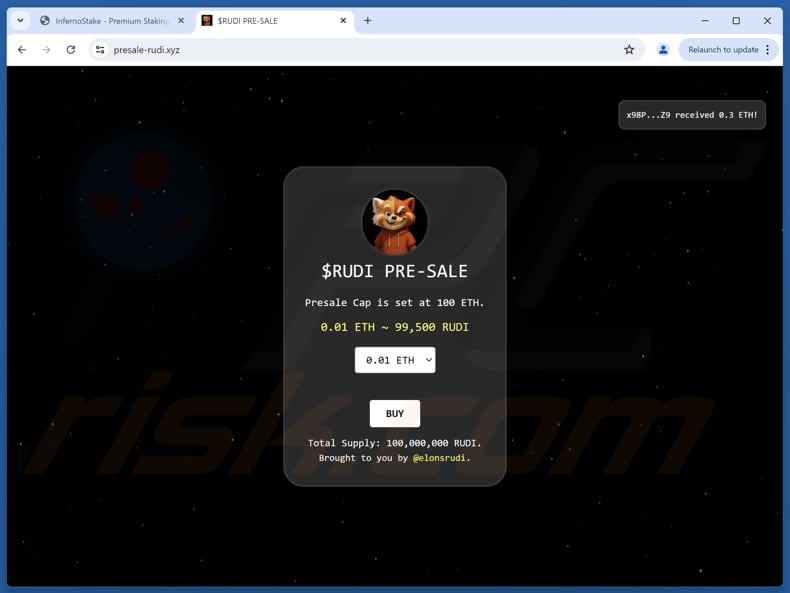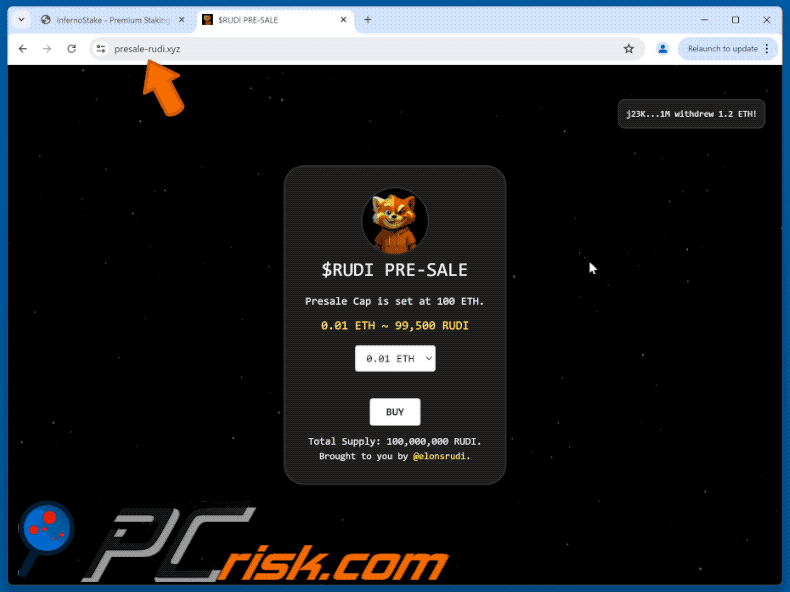How to identify fake offers like "$RUDI Pre-sale"
Phishing/ScamAlso Known As: Fake $RUDI Pre-sale site
Get free scan and check if your device is infected.
Remove it nowTo use full-featured product, you have to purchase a license for Combo Cleaner. Seven days free trial available. Combo Cleaner is owned and operated by RCS LT, the parent company of PCRisk.com.
What is "$RUDI Pre-sale" scam?
Our analysis of the website (presale-rudi[.]xyz) has shown that it is a scam where fraudsters promote a fraudulent cryptocurrency project. The scammers behind it aim to drain crypto wallets. Thus, victims of this scam can experience significant monetary loss. This and similar scams should be avoided.

IMPORTANT NOTE: We do not review crypto projects, please do your own research when investing money.
Federal Trade Commission (FTC) states that since the start of 2021, more than 46,000 people have reported losing over $1 billion in crypto to scams – that's about one out of every four dollars reported lost, more than any other payment method.
"$RUDI Pre-sale" scam in detail
This scam page presents a fraudulent presale for a token called $RUDI, claiming a total supply of 100 million tokens. It states that the presale cap is limited to 100 ETH and offers an exchange rate of approximately 99,500 RUDI per 0.01 ETH. The page instructs users to connect their wallets to buy tokens.
After a user connects their wallet, the site runs a crypto-draining tool that accesses the wallet and transfers funds to a wallet controlled by scammers. Due to the irreversible nature of blockchain transactions, recovery is nearly impossible once the funds are stolen, and victims are often left with permanent financial losses.
For this reason, it is essential to verify the authenticity of any crypto platform before participating in airdrops, presales, or similar events, especially when wallet access or personal data is requested.
| Name | Fake $RUDI Pre-sale site |
| Threat Type | Scam, Social Engineering, Fraud |
| Fake Claim | Users can participate in a $RUDI pre-sale |
| Disguise | Legitimate crypto platform |
| Related Domain | presale-rudi[.]xyz |
| Detection Names (presale-rudi[.]xyz) | alphaMountain.ai (Suspicious) G-Data (Phishing), Trustwave (Suspicious), Full List Of Detections (VirusTotal) |
| Symptoms | Unofficial domain, lack of official verification, unrealistic claims, too good-to-be-true promises |
| Distribution methods | Fake social media accounts, deceptive websites, rogue online advertisements |
| Damage | Cryptocurrency theft |
| Malware Removal (Windows) |
To eliminate possible malware infections, scan your computer with legitimate antivirus software. Our security researchers recommend using Combo Cleaner. Download Combo CleanerTo use full-featured product, you have to purchase a license for Combo Cleaner. 7 days free trial available. Combo Cleaner is owned and operated by RCS LT, the parent company of PCRisk.com. |
Similar scams in general
These scams are designed to appear legitimate while secretly aiming to drain wallets. Once funds are stolen, they cannot be recovered (in most cases). To avoid becoming a victim, users should ensure the platform is trustworthy before connecting a wallet, making any transactions, or entering personal information.
Similar schemes are the fake "Spheron (SPON) Reward", "Coresky Airdrop", and "Project Dapps Main Net" scams.
How did I open a scam website?
Scams involving drainers are often promoted through fake or compromised accounts on social media platforms like X (formerly Twitter) and Facebook. Scammers also hijack legitimate WordPress websites and repurpose them to distribute these fraudulent campaigns. Scams can also be delivered using deceptive emails containing malicious links or attachments.
Furthermore, users may unknowingly land on scam websites through adware infections, misleading pop-ups, fake browser notifications, or suspicious ads placed on unreliable sites. Malicious advertising networks (frequently embedded in torrent pages, adult content platforms, and sites offering illegal streaming services) serve as another avenue for luring users into scams.
How to avoid visiting scam pages?
Ensure your operating system and software stay up to date, and run regular scans using trustworthy antivirus tools. When browsing, avoid clicking on ads, pop-up windows, or anything that seems questionable. Also, avoid granting notification permissions to websites that appear suspicious.
Be wary of emails or messages from unfamiliar sources, particularly those containing links or attachments. Always download programs and files only from reputable platforms like official websites or verified app stores. If your computer is already infected with unwanted apps, we recommend running a scan with Combo Cleaner Antivirus for Windows to automatically eliminate them.
The appearance of "$RUDI Pre-sale" scam (GIF):

Instant automatic malware removal:
Manual threat removal might be a lengthy and complicated process that requires advanced IT skills. Combo Cleaner is a professional automatic malware removal tool that is recommended to get rid of malware. Download it by clicking the button below:
DOWNLOAD Combo CleanerBy downloading any software listed on this website you agree to our Privacy Policy and Terms of Use. To use full-featured product, you have to purchase a license for Combo Cleaner. 7 days free trial available. Combo Cleaner is owned and operated by RCS LT, the parent company of PCRisk.com.
Quick menu:
- What is Fake $RUDI Pre-sale site?
- How to identify a pop-up scam?
- How do pop-up scams work?
- How to remove fake pop-ups?
- How to prevent fake pop-ups?
- What to do if you fell for a pop-up scam?
How to identify a pop-up scam?
Pop-up windows with various fake messages are a common type of lures cybercriminals use. They collect sensitive personal data, trick Internet users into calling fake tech support numbers, subscribe to useless online services, invest in shady cryptocurrency schemes, etc.
While in the majority of cases these pop-ups don't infect users' devices with malware, they can cause direct monetary loss or could result in identity theft.
Cybercriminals strive to create their rogue pop-up windows to look trustworthy, however, scams typically have the following characteristics:
- Spelling mistakes and non-professional images - Closely inspect the information displayed in a pop-up. Spelling mistakes and unprofessional images could be a sign of a scam.
- Sense of urgency - Countdown timer with a couple of minutes on it, asking you to enter your personal information or subscribe to some online service.
- Statements that you won something - If you haven't participated in a lottery, online competition, etc., and you see a pop-up window stating that you won.
- Computer or mobile device scan - A pop-up window that scans your device and informs of detected issues - is undoubtedly a scam; webpages cannot perform such actions.
- Exclusivity - Pop-up windows stating that only you are given secret access to a financial scheme that can quickly make you rich.
Example of a pop-up scam:

How do pop-up scams work?
Cybercriminals and deceptive marketers usually use various advertising networks, search engine poisoning techniques, and shady websites to generate traffic to their pop-ups. Users land on their online lures after clicking on fake download buttons, using a torrent website, or simply clicking on an Internet search engine result.
Based on users' location and device information, they are presented with a scam pop-up. Lures presented in such pop-ups range from get-rich-quick schemes to fake virus scans.
How to remove fake pop-ups?
In most cases, pop-up scams do not infect users' devices with malware. If you encountered a scam pop-up, simply closing it should be enough. In some cases scam, pop-ups may be hard to close; in such cases - close your Internet browser and restart it.
In extremely rare cases, you might need to reset your Internet browser. For this, use our instructions explaining how to reset Internet browser settings.
How to prevent fake pop-ups?
To prevent seeing pop-up scams, you should visit only reputable websites. Torrent, Crack, free online movie streaming, YouTube video download, and other websites of similar reputation commonly redirect Internet users to pop-up scams.
To minimize the risk of encountering pop-up scams, you should keep your Internet browsers up-to-date and use reputable anti-malware application. For this purpose, we recommend Combo Cleaner Antivirus for Windows.
What to do if you fell for a pop-up scam?
This depends on the type of scam that you fell for. Most commonly, pop-up scams try to trick users into sending money, giving away personal information, or giving access to one's device.
- If you sent money to scammers: You should contact your financial institution and explain that you were scammed. If informed promptly, there's a chance to get your money back.
- If you gave away your personal information: You should change your passwords and enable two-factor authentication in all online services that you use. Visit Federal Trade Commission to report identity theft and get personalized recovery steps.
- If you let scammers connect to your device: You should scan your computer with reputable anti-malware (we recommend Combo Cleaner Antivirus for Windows) - cyber criminals could have planted trojans, keyloggers, and other malware, don't use your computer until removing possible threats.
- Help other Internet users: report Internet scams to Federal Trade Commission.
Frequently Asked Questions (FAQ)
What is a crypto scam?
These are deceptive websites that imitate legitimate cryptocurrency platforms, such as exchanges and wallets, in an attempt to trick users into performing steps benefiting scammers.
What is the purpose of a crypto scam?
The primary objective is usually to steal cryptocurrency. To achieve this, scammers employ a range of tactics, such as as deceiving users into revealing their login credentials or getting them to unknowingly run crypto-draining tools.
Why do I encounter scam sites?
Different deceptive tactics are used to push scam websites, such as fake social media profiles and manipulative advertisements. Users can also be exposed to scam pages through untrustworthy ad networks (commonly tied to torrent sites, adult platforms, and pirated streaming services), as well as through shady browser notifications and fraudulent emails.
Will Combo Cleaner protect me from scams?
Combo Cleaner analyzes websites for security risks, identifies scam pages, notifies users of threats, and prevents access to harmful content.
Share:

Tomas Meskauskas
Expert security researcher, professional malware analyst
I am passionate about computer security and technology. I have an experience of over 10 years working in various companies related to computer technical issue solving and Internet security. I have been working as an author and editor for pcrisk.com since 2010. Follow me on Twitter and LinkedIn to stay informed about the latest online security threats.
PCrisk security portal is brought by a company RCS LT.
Joined forces of security researchers help educate computer users about the latest online security threats. More information about the company RCS LT.
Our malware removal guides are free. However, if you want to support us you can send us a donation.
DonatePCrisk security portal is brought by a company RCS LT.
Joined forces of security researchers help educate computer users about the latest online security threats. More information about the company RCS LT.
Our malware removal guides are free. However, if you want to support us you can send us a donation.
Donate
▼ Show Discussion